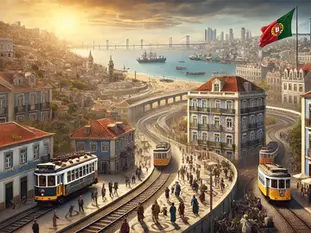Exploring the Rich Culture of Angola and Portugal

Imperialism and Colonialism: Contrasting the Dynamics of Power Then and Now
2
0
0
The hypothetical scenario of modern states like Russia, China, and the USA engaging in imperialism by invading other countries brings to light various historical and contemporary issues related to imperialism, and contrasts sharply with the colonialism practiced by Portugal and Great Britain in previous centuries.
Imperialism typically refers to a state expanding its power and influence through the acquisition of lands via conquest, diplomacy, or military force. Colonialism, in turn, involves the colonization of these territories and their economic, cultural, or administrative exploitation. Both concepts overlap but have distinct characteristics that set them apart.
Historical Context and Justification
During their colonial eras, Portugal and Great Britain established colonies across the globe. These actions were often justified by a mixture of spreading Christianity, economic exploitation, and geopolitical competition with other European powers. The perspective of a "civilizing mission" was used as a moral argument for territorial expansion and the subjugation of colonized peoples.
In contrast, modern actions by Russia, China, and the USA often involve asserting influence or control over regions without the intent of direct colonization. These actions are typically justified under pretenses such as protecting national interests, security, or cultural ties. For example, the annexation of Crimea by Russia was justified as a move to protect Russian-speaking communities and preserve strategic interests.
Economic Motivations
For Portugal and Great Britain, economic gain was a primary motivation, with the home countries benefiting from the resources and labor of their colonies. The extraction of gold, silver, ivory, spices, and other natural resources financed Europe's development for centuries, while colonized populations were subjected to forced labor or systems of dependency.
For modern empires of influence, like Russia, China, and the USA, economic interests are also significant. Controlling territories or influencing governments can secure access to strategic resources, trade routes, and markets. The Chinese initiative known as the "Belt and Road" exemplifies how infrastructure and economic support can be used to establish economic dependence that, in many cases, leads to political and strategic influence.
Political and Social Impacts
Colonialism led to a significant reconfiguration of the social, cultural, and governance structures of colonized regions. Indigenous ways of life were often suppressed, while colonial powers imposed their administrative systems and cultural values. This often resulted in irreversible cultural destruction and the creation of social hierarchies imposed by the colonizers. A clear example is the artificial division of borders in Africa, which has led to prolonged conflicts and instability.
Modern imperialism, on the other hand, involves influence and coercive pressure over the political and economic systems of other nations. Instead of direct colonization, this is done through political alliances, military presence, and especially economic dependence. The war in Ukraine and the economic sanctions imposed on Russia are examples of how these mechanisms of influence have global repercussions, affecting both bilateral relations and the world economy.
International Relations and Legality
Today, international norms largely condemn both imperialism and colonialism, promoting sovereign equality among states and non-intervention in internal affairs. However, powerful countries like Russia, China, and the USA often navigate around these norms due to their geopolitical influence, economic power, and, in some cases, their veto power in international bodies such as the UN Security Council.
During the colonial era, such a structure of international governance was practically non-existent. Colonial powers dominated their territories without significant legal repercussions from a global community, and there were no forums like the UN to hold them accountable for abuses. It was only after World War II, with the creation of the United Nations and the advent of decolonization movements, that the principles of self-determination and sovereignty began to gain strength.
Conclusion: Evolving Dynamics of Control
While the methods and justifications for modern imperialism and historical colonialism are different, the underlying motivations of geopolitical and economic gain remain remarkably similar. The evolution of methods, which have shifted from direct colonization to indirect influence and political manipulation, aligns with the development of international norms that restrict open imperialism.
This discussion serves as a reminder that global power does not disappear—it adapts. Today, imperialism does not manifest through colonization but rather through more subtle means that often escape the scrutiny of international law. Understanding these dynamics helps us recognize the forces that continue to shape the modern world and deal with their consequences in an informed and critical manner.
END







